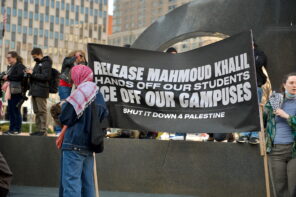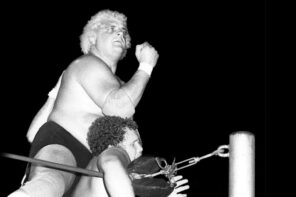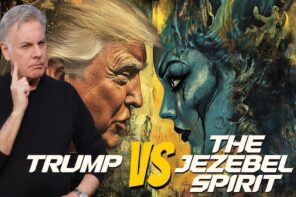At the Texas Observer, Forrest Wilder has a story about the larger story of two Texas pastors who in 2009 went to Rick Perry to tell him, as Wilder puts it, that “a chain of powerful prophecies had proclaimed that Texas was ‘The Prophet State,’ anointed by God to lead the United States into revival and Godly government. And the governor would have a special role.”
Perry, Wilder argues, is venturing into new territory for an aspiring presidential candidate by courting pastors who are followers of the New Apostolic Reformation. The NAR apostles, he writes, have “bizarre” beliefs, including “some” who “consider Freemasonry a ‘demonic stronghold’ tantamount to witchcraft” and one who thinks the Democratic Party “is controlled by Jezebel and three lesser demons.” These unusual beliefs, says Wilder, wouldn’t be so remarkable except for the NAR’s “growing fascination with infiltrating politics and government.” NAR adherents want to “not just take ‘dominion’ over government, but stealthily climb to the commanding heights of what they term the ‘Seven Mountains’ of society, including the media and the arts and entertainment world. They believe they’re intended to lord over it all. As a first step, they’re leading an ‘army of God’ to commandeer civilian government.”
None of that, though, is new. Taking dominion of government and other social, cultural, and political structures has long been the overtly stated goal of the religious right, long documented by scholars and journalists from Sara Diamond to Fred Clarkson to Michelle Goldberg. The NAR might have coined the “Seven Mountains” terminology, but it’s just a different way of presenting what the religious right has wanted all along. As John Turner, University of South Alabama historian and author of Bill Bright and the Campus Crusade for Christ: The Renewal of Evangelicalism in Postwar America, told me recently:
To me, it’s [Seven Mountains] just a catchy phrase that encapsulates what Bright and many other evangelical leaders were already doing — trying to increase Christian influence (they would probably use more militant phrases like “capture”) in the spheres of education, business, and government. Hence, Bright tried to start a Christian university, started a “Christian Embassy” in Washington (at about this time), and started ministries to businessmen. I think he had a sense that broad-based evangelism alone wouldn’t “restore America to its Christian roots.” Campus Crusade had been converting scores of students and others for more than two decades, but he lamented that society was nevertheless becoming “less Christian.” Therefore, Christians should target the key leaders of society, evangelizing them and trying to change the culture of these institutions by electing more Christian politicians, etc.
Nor is the Republican dance with spirit-filled, demon-casting-out, laying-on-of-hands Pentecostals new. Bright, incidentally, played a crucial role during the Reagan era of bringing Pentecostals—you know, those spirit-filled people with all those bizarre beliefs and worship practices—into the political fold. As I wrote in 2008 after Virginia Beach Pentecostal pastor John Gimenez died of a stroke at the age of 76:
Gimenez was not well known outside Pentecostal circles, but he was an instrumental figure in bringing together prominent evangelicals and charismatic Christians in the political movement to install Christian dominion in government. At the event last spring, Gimenez talked about how he worked with Campus Crusade for Christ founder Bill Bright to organize the April 1980 Washington for Jesus rally, which he credited with bringing out evangelical voters for Ronald Reagan. Gimenez subsequently organized hundreds of America for Jesus rallies as well as additional rallies in Washington, intended to spark an evangelical revival in politics.
Gimenez talked about how Bright dismissed the supposed rift between charismatics and other evangelicals. “I heard he didn’t like people like me,” Gimenez said to laughter from his tongue-talking audience. “That’s what the propaganda was.” But, Gimenez recounted, Bright believed that God had willed them to work together, and he canceled his own rally to merge it with Gimenez’s. According to Gimenez, Bright later told Ronald Reagan, “Mr. President, you were elected on April 29, 1980, when the church prayed that God’s will would be done.”
In the Pentecostal world, and accordingly in the political world, there is a lot of that there is a lot of cross-pollination and sharing and borrowing (and in some cases, plagiarizing) of ideas and strategies. There’s a lot of money to be made in conferences, books, CDs and DVDs of conferences, tithes and offerings, and so forth. Having a “new” prophesy about what God is telling you to do can be very lucrative.
The NAR, as Wilder recounts, was founded by C. Peter Wagner, was in my view a marketing ploy for a new kind of Pentecostalism. The ideas aren’t new; the marketing strategy perhaps is. As Anthea Butler wrote in these pages in 2009:
The NAR roots are also firmly within the boundaries of the historic Pentecostal movement. Foundational to NAR beliefs are spiritual warfare and dominion over social ills. These beliefs were influenced in part by two English authors, Smith Wigglesworth and Jessie Penn Lewis, who wrote extensively on spiritual warfare, and were read avidly by some early Pentecostals.
Their books, still in print today, focused on demonic possession, deliverance, and powerful spiritual encounters. In the 1940s the movement that would give these beliefs further impetus was the Latter Rain Movement, which arose out of revivals in Canada. Focusing on extraordinary outpourings of the Holy Spirit, with spectacular spiritual manifestations, believers and leaders in the movement like William Branham believed these manifestations would usher in the second coming of Christ. The movement also caused splits within several Pentecostal denominations, most notably the Assemblies of God. Unlike the Word of Faith movement, the Latter Rain Movement and its subsequent iterations relied on “extra” revelation outside of the Bible, given to a special group of leaders that God had appointed.
The focus on “apostolic” leadership would reappear in the Shepherding moment of the 1970s, a movement that quickly died after several scandals in leadership. Not long after, in the early 1980s, the star of C. Peter Wagner began to ascend in what was then called the School of World Mission at Fuller Seminary. Wagner, who for a time taught at Fuller Seminary alongside other “power encounter” teachers John Wimber (founder of the Vineyard denomination) and Charles Kraft, began there to hone his ideas about spiritual mapping, spiritual warfare, and power encounters. Leaving the seminary in the early 1990s to establish a ministry in Colorado Springs, Wagner began to build his empire, founding the NAR in 2001.
The 21st century, for Wagner, is the beginning of the “Second Apostolic Age.” Those in the NAR believe that in order to bring about the coming of Christ, Apostles must be recognized, and the government should be run by Christians in order to cleanse the world for Christ’s coming. Power encounters such as exorcisms must be done to cleanse not only people, but cities and communities; and those who participate in this will also lead in the new Reformation.
As a result, you will see someone like Rod Parsley, who is generally thought of as a Word of Faith preacher, discussing his own spiritual debt to Wigglesworth and affirming his adherence to the “five-fold” ministry offices — people are anointed as prophets, apostles, teachers, evangelists, or pastors (an interpretation many Christian critics say is a false teaching). And talk about “bizarre” beliefs: Parsley and the other Word of Faith adherents think that if you give them money for their private jets and luxury houses God will make you rich!
This is someone who Family Research Council president Tony Perkins, in a 2005 appearance on the Trinity Broadcasting Network, called a “new general” in a Christian army bringing a revival to “every realm of life.” This was around the same time that Perry wrapped his arms around Parsley, too, inviting him (and The Response host Don Wildmon) to a controversial bill-signing ceremony. In a church. On a Sunday. The battleground, in other words, is not new, and the NAR isn’t the only stream of Pentecostal or evangelical thought giving politicians spiritual warrior ideas.
The cross-pollination plays out in the political sphere as well. Gimenez’s relationship with Bright, and the ongoing relationship between Pentecostals and the Republican Party was further cultivated by Bush family advisor Doug Wead, as I detail in my book. (Wead is currently an advisor to the Ron Paul campaign.) James Robison, who has played such a key role in the current rallying around Perry, was one of 12 prominent religious leaders Wead suggested, in 1985, that then-Vice President George H.W. Bush should court. Wead noted how Robison’s fellow Southern Baptists were “offended when he recently claimed to have experienced ‘deliverance’ from an ‘evil spirit.'” But many prominent Southern Baptists appear to have moved past such concerns. At The Call on the National Mall in 2008, hosted by Lou Engle, one of the NAR-influenced instigators of Perry’s prayer rally, Mike Huckabee and Perkins (both Southern Baptists) were featured guests. In the 2005 appearance on the spirit-filled, prophecy-laced TBN, Perkins joked, “don’t let my Southern Baptist friends see me dancing.”
In an example of how fortunes rise and fall, others in Wead’s Top 12 included Jimmy Swaggart and Jim Bakker. Still others, like Word of Faith televangelist Kenneth Copeland, demonstrate longevity: in 1998 Wead told Bush advisor Karl Rove Copeland was “arguably one of the most important religious leaders in the nation;” Copeland was out raising money for Mike Huckabee in 2008, and was included in Robison’s recent “supernatural gatherings.” Unlike the “apostles” who boasted of their impact on Perry, Copeland has long been more discreet: how many people know that when George W. Bush was governor of Texas, Copeland thought it was “very urgent” that Bush have a book that claimed to prophesy events in the West Bank based on the Book of Ezekiel? (I have much more on Copeland in God’s Profits.)
Religious movements don’t come out of nowhere; that there is a lot of cross-pollination and sharing and borrowing (and in some cases, plagiarizing) of ideas and strategies. If you watch the Trinity Broadcasting Network, or GOD TV, for example, you’ll see the cross-pollination of the Word of Faith and the prophesying of the self-proclaimed prophets of the NAR. Yes, the NAR has had a ripple effect through the charismatic world: last year I traveled to the small town of Henderson, Kentucky, where I saw the Women, Weapons of Warfare conference that centered on spiritual warfare and prophecy, and included, from some speakers, homages to NAR-ers like Chuck Pierce and Dutch Sheets. But when I asked one of the WWW founders, Vicky Mpofu, who were her greatest spiritual influences she named not the NAR, but Word of Faith godfather Kenneth Hagin. That’s not to say that the NAR isn’t important, just that it’s a movement in a stream of intertwining movements, which have become intertwined in our politics, that borrow and play off of each other.
As I’ve written before, events like The Call and Women, Weapons of Warfare are the template for Perry’s The Response, and Perry isn’t the first politician to sit up and take notice. Women, Weapons of Warfare’s generals were sought out by the American Center for Law and Justice, whose principal, Jay Sekulow, is a prominent Supreme Court litigator, political player (and one-time Mitt Romney endorser). Rick Perry didn’t invent these relationships; he’s just cultivated them in a far more public way.
In other words: yes, Perry’s event is deeply problematic, as I’ve argued before. Some of his apostles, it is true, have a penchant for the most outlandish prophecy. But if you see it as a bolt of lightning through which Rick Perry has created something weirdly new, you’re missing the larger picture. He’s being more bold and unabashed in courting some of the lesser known (and therefore less politically astute) figures than some of his predecessors have been, and that might be a strategy that backfires on him. But he’s following a long legacy, as is the NAR.
UPDATE, 7/19/11: Just as Perry is claiming that he can’t help it if early endorsers of The Response say the darndest things, the event is gaining traction with religious right elites. This is yet more proof of their willingness to be (in Francis Schaeffer’s parlance) co-belligerents alongside people with whom they have (what they perceive to be) theological disagreements but with whom they share political goals. It’s also evidence of the Bill Bright strategy stretching into the 21st century. As Turner documents in his book on Bright, the Washington for Jesus rally he organized with Gimenez in 1980 had a goal of being “a twelve-hour prayer rally, focusing on the need to restore God’s favor to the United States through repentance.” Sound familiar? The only religious right hot shot who didn’t show support for that one was Jerry Falwell, because, according to Turner, “he was hesitant to cooperate with charismatics and Pentecostals.” Later in his life, though, that changed for him and the religious right generally.
It’s also evidence, incidentally, that John McCain’s 2008 decision to reject endorsements from John Hagee and Rod Parsley because of their inflammatory statements (but not their careers of questionable ethics and war mongering) was an aberration for a GOP presidential aspirant. Perry, in his comments to the Dallas Morning News this week, suggested that some of the co-sponsors and participants in his prayer rally are like endorsers of a political campaign; he can’t help it if they compare gay people to Nazis, for example. But obviously this is more than an endorsement; it’s a collaboration. And it’s a collaboration that is gaining not just more endorsers, but the imprimatur and participation of the religious right elite. At this point the more interesting development to watch is how much traction it gets with the grassroots.













